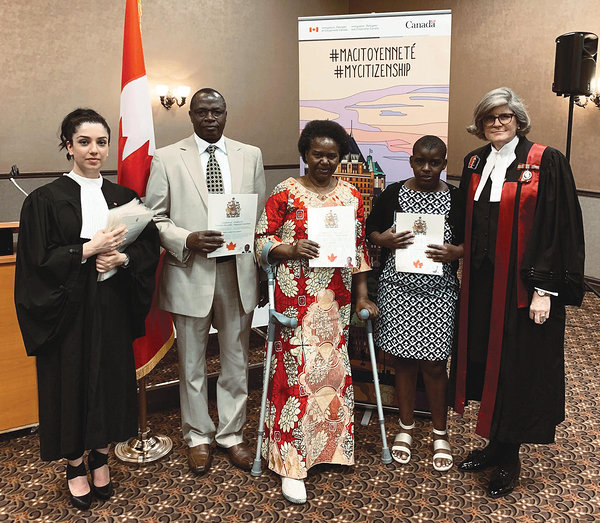Intercultural ministry launches
Citizenship officials flank the Rev. Thomas Ntilivamunda (left) along with his wife and daughter, Yaël and Gemimah (centre and right), at their citizenship ceremony. Ntilivamunda has started a new intercultural ministry in Quebec City. Photo: Contributed
By Matthew Townsend
Communications Missioner
The Diocese of Quebec has as a new intercultural ministry—and it’s being organized by one of Canada’s newest citizens.
Earlier this year, the Rev. Thomas Ntilivamunda was named bishop’s missioner, a role that tasks him with two different but related challenges in the diocese: forming an intercultural ministry for newcomers to Quebec and offering the diocese’s parishes counsel on missional outreach.
The intercultural ministry officially launched on July 7, with about a dozen worshippers joining Ntilivamunda. Hosted at All Saints’ Chapel (adjacent to the bishop’s residence) on Sundays at 3:30 p.m., the ministry, the priest says, was launched to serve newcomers not presently connected with a church in Quebec City. It also diversifies the diocese’s services, both in style and time, allowing people who work late on Saturday night to more easily attend church.
“It went well, with a few logistical challenges here and there, but we had a good service,” he says.
Ntilivamunda began the project by reaching out to five people he knew to be “same-minded about mission and evangelism”—people who appreciate the difficulty immigrants can face integrating into a place of worship in Quebec. Ntilivamunda knows the experience of immigrants firsthand. From Rwanda, the priest and his family came to Quebec as asylum seekers.
He, his wife Yaël, and their daughter Gemimah became Canadian citizens a few months ago.
After meeting, the group decided the ministry was worth a try. So far, the participants are, like Ntilivamunda, African—Burundians and Rwandans, he says. Thus, one of the ministry’s major purposes is to integrate “various aspects of the Anglican church from all over the world,” giving people who come “an opportunity to express their way of worship.”
This includes musical diversity, too. At the first gathering, a few people brought guitars. The internet, Ntilivamunda says, was also a helpful instrument—they put up a screen to project hymns.
“My philosophy is the people are the ones to determine the music they want. The important thing is to check the theology in the music, that is the role of a priest,” he explains. “But whether it is American music, African music, Jamaican, whatever, that is their culture—if they are there, we have to offer some opportunity for them to express themselves, to feel at home and sing in their regional mode.”
As the mission moves forward, the priest hopes to provide more translation and diversity of instruments. For now, he says, he is inviting people to pray for the intercultural ministry and is reaching out to others who have yet to find a church home.
The intercultural ministry isn’t Ntilivamunda’s only new venture—the priest, with support from Bishop Bruce Myers and Canon Theologian Jeffrey Metcalfe, is also offering consultation with parishes on how to expand their own missions.
While some congregations are involved in feeding ministries, Ntilivamunda says he hopes to help Anglicans consider new ways of “making human contact.” The priest thinks that the church’s survival and its commitment to mission are intertwined. “The church, at its beginning, is a missionary church,” he says. “When Jesus called the disciples, then he sent them out…. Mission is the backbone of the church. Without mission, the church does not stand.”
Part of this work, he says, involves looking at how the church can serve people outside of political systems which confine the church to buildings that only pull people inward and send financial assistance outward.
For Anglicans who want to have this discussion—and brainstorm ways to get involved in mission and evangelism—Ntilivamunda can be contacted at the diocesan office at (418) 692-3858.

